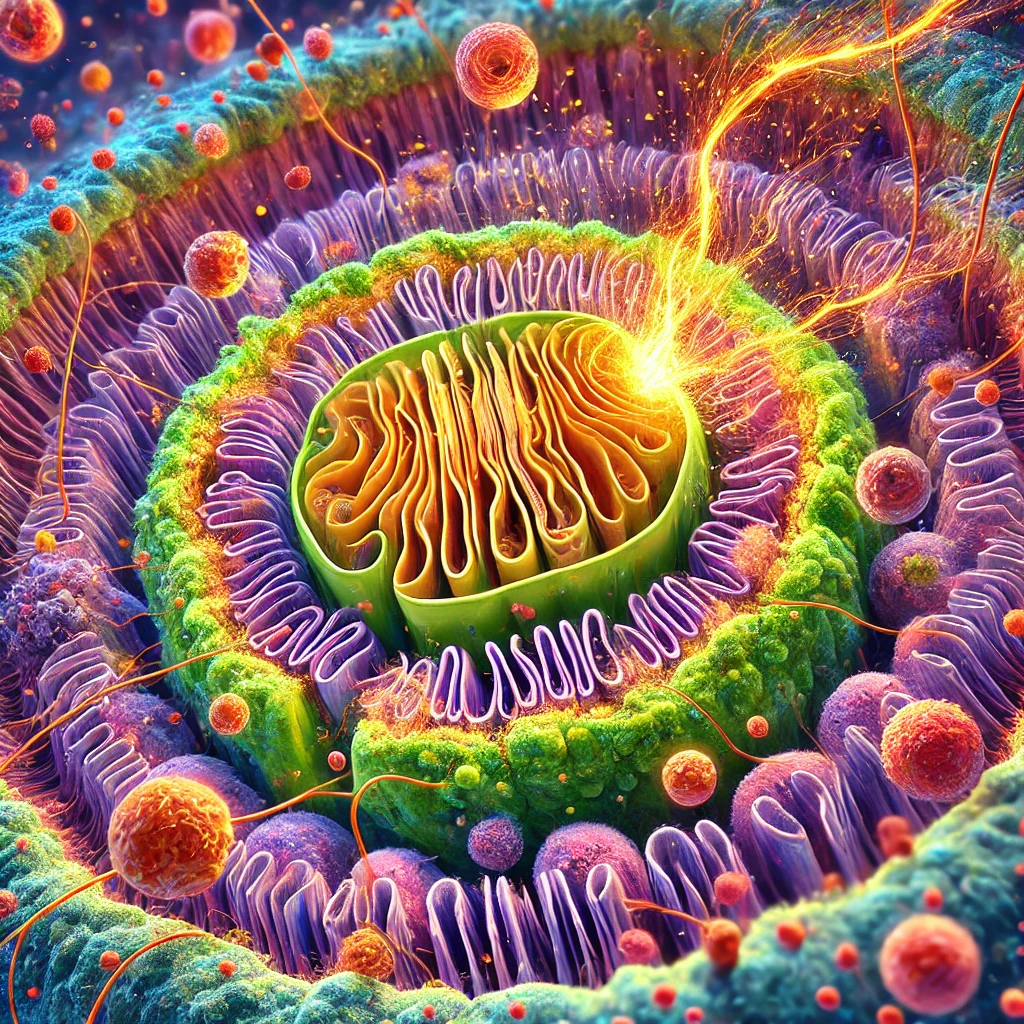
Want to listen instead?
From Free Radicals to Cellular Health: A Deep Dive into Antioxidants and Metabolism 🌟
- Welcome to another enlightening exploration brought to you by Mindful Diabetes Inc., as part of our “Pathways to Wellness” series. Today, we’re venturing into the fascinating world of cellular health, focusing on the interplay between antioxidants, free radicals, and metabolism. At first glance, these may seem like separate topics, but at the cellular level, they are deeply intertwined, playing crucial roles in both maintaining health and contributing to disease when imbalanced.
- Understanding how our cells manage oxidative stress through antioxidants, and how this relates to metabolic processes, is vital. This insight not only helps us grasp the foundations of cellular health but also opens doors to innovative strategies for managing chronic conditions like diabetes and neurodegenerative diseases.
- Join us as we bridge the gap between these essential cellular processes, exploring their roles from a benign physiological perspective to a deeper dive into the molecular mechanisms that underpin health and disease.
❤️ Join Us in Preventing Type 3 Diabetes
Your gift supports scientifically backed prevention programs, cognitive-health education, and AI tools that help families reduce the risk of Alzheimer’s-like symptoms linked to diabetes.
Mindful Diabetes Inc. is a 501(c)(3) nonprofit — all donations are fully tax-deductible.
Section 1: Antioxidants and Free Radicals – The Cellular Tug of War
The Role of Free Radicals in Cellular Function
Free radicals, particularly reactive oxygen species (ROS), are natural byproducts of cellular metabolism. While often painted as villains due to their role in oxidative stress, ROS are essential for certain cellular functions, such as signaling pathways and immune responses.
- ROS and Cellular Metabolism: During the process of converting nutrients into energy within the mitochondria, ROS are produced. These molecules can act as signaling agents, helping to regulate processes like cell growth and immune responses.
- Oxidative Stress: However, when ROS production exceeds the cell’s antioxidant defenses, oxidative stress occurs. This imbalance can damage cellular components like DNA, proteins, and lipids, leading to dysfunction and contributing to diseases such as diabetes and Alzheimer’s.
Antioxidants – The Body’s Defense Mechanism
Antioxidants are the cell’s primary defense against the damaging effects of free radicals. They neutralize ROS, preventing oxidative stress and maintaining cellular integrity.
- Types of Antioxidants: Our bodies produce several antioxidant enzymes, such as superoxide dismutase and catalase, which play crucial roles in detoxifying harmful ROS. Additionally, dietary antioxidants like vitamins C and E further bolster our defenses.
- Antioxidant Action in Metabolism: These antioxidants do more than just neutralize free radicals; they are also involved in metabolic regulation. For example, the activation of the NRF2 pathway, a key antioxidant response, is essential in maintaining cellular health during metabolic stress.
🌟 Try Our Free Wellness Tools!
Set the high score in our Mindful Eating Game, explore JEIR, or dive deeper into the science behind our AI-driven prevention tools!
🤖 Try JEIR — Your AI Wellness Guide 🎮 Play the Mindful Eating Game 📘 Read About the Mindful Eating Game 🤖📘 Read About the AI Behind JEIRSection 2: Metabolism and Redox Balance – The Energy Connection
Mitochondria – The Powerhouse and ROS Factory
Mitochondria are often called the “powerhouses” of the cell, but they are also the primary source of ROS during energy production. The balance between energy generation and ROS production is delicate and critical for cellular health.
- Energy Production and ROS: As cells convert glucose and oxygen into ATP, electrons can leak from the mitochondrial electron transport chain, reacting with oxygen to form superoxide, a type of ROS.
- Mitochondrial Dysfunction: When mitochondria become dysfunctional, often due to aging or metabolic disorders like diabetes, they produce excessive ROS, which can overwhelm antioxidant defenses and lead to cellular damage.
Redox Balance in Health and Disease
Maintaining a balance between ROS production and antioxidant defenses is crucial for cellular health. This balance, known as redox homeostasis, is vital in preventing chronic diseases.
- Diabetes and Oxidative Stress: In conditions like diabetes, chronic hyperglycemia leads to increased ROS production, contributing to oxidative stress. This stress is a key factor in the development of diabetic complications, including cardiovascular disease and neuropathy.
- Therapeutic Potential: Emerging research suggests that enhancing antioxidant defenses, through diet or pharmacological interventions, could mitigate oxidative stress and improve metabolic health, offering new strategies for managing diabetes and related conditions.
Section 3: Diving Deeper – Cellular Processes and Disease Implications
The Impact of Oxidative Stress on Neurodegeneration
Oxidative stress not only affects metabolic health but also plays a significant role in neurodegenerative diseases like Alzheimer’s. Understanding this connection opens new avenues for prevention and treatment.
- Oxidative Damage in the Brain: Neurons are particularly vulnerable to oxidative stress due to their high metabolic demand and relatively low antioxidant defenses. This makes oxidative stress a key player in the progression of neurodegenerative diseases.
- Link to Diabetes: There is a growing body of evidence linking diabetes, particularly Type 2 and the less-known Type 3 (often associated with Alzheimer’s), to increased oxidative stress. This connection suggests that managing oxidative stress could be a crucial strategy in preventing cognitive decline in diabetic patients.
Innovative Approaches in Antioxidant Therapy
With the growing understanding of the role of oxidative stress in chronic diseases, researchers are exploring novel antioxidant therapies that could revolutionize treatment approaches.
- Antioxidant Supplements and Diet: While traditional antioxidants like vitamins C and E are well-known, newer compounds such as resveratrol and curcumin are being studied for their potent antioxidant properties and potential to enhance metabolic and cognitive health.
- Future Directions: Scientists are also investigating the possibility of boosting endogenous antioxidant systems through genetic or pharmacological means, offering hope for more targeted and effective treatments for oxidative stress-related diseases.
Conclusion: Embracing Cellular Health with Antioxidants and Metabolism
- As we conclude this deep dive into the world of antioxidants, free radicals, and metabolism, it’s clear that maintaining cellular balance is essential for overall health. Understanding how these processes are interconnected not only helps us appreciate the complexity of our biology but also provides practical insights into managing and preventing chronic diseases.
- At Mindful Diabetes Inc., our mission through the “Pathways to Wellness” series is to empower you with the knowledge to take control of your health. By focusing on the cellular level, we can develop strategies that protect against oxidative stress, enhance metabolic health, and reduce the risk of diseases like diabetes and Alzheimer’s.
- Join us in continuing to explore the fascinating world of cellular health and discover how small changes can lead to significant improvements in your well-being. Together, we’re paving the way to a healthier future, one cell at a time.
📖 Continue Exploring 🌐
Don’t stop here! Dive deeper into the fascinating connection between mental wellness and physical health in our upcoming blogs. There’s always more to discover and explore.
💌 Stay Informed and Inspired 📬
Subscribe to our newsletter for the latest insights, tips, and updates on the mindful path to better health. Together, we’ll continue to unlock the secrets of a balanced and vibrant life.
Thank you for your continued support and readership. Here’s to a healthier, happier you! 🌈💚




